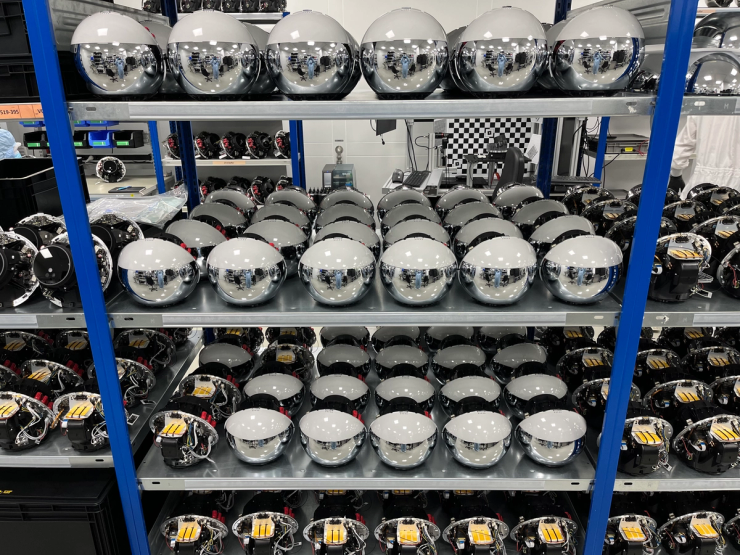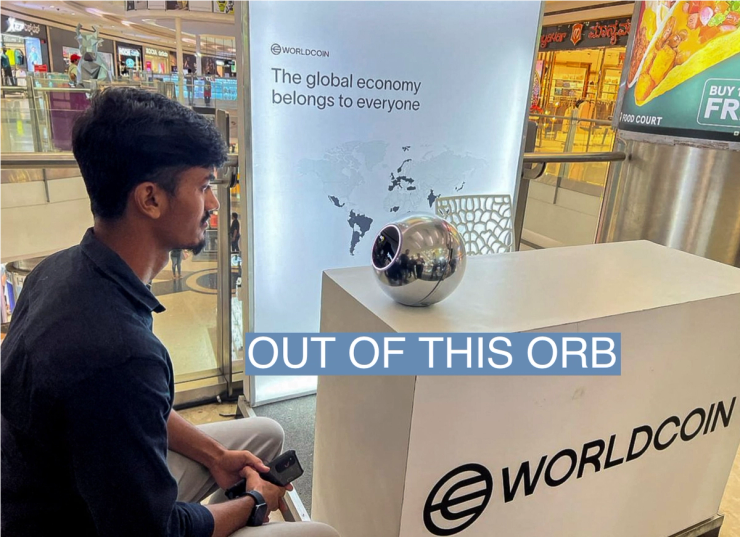The Scoop
One of the most ambitious and mind bending startups of the crypto era has run into an unexpected problem: It’s running low on orbs.
The company behind the Worldcoin cryptocurrency project, backed by OpenAI chief Sam Altman, is facing a shortage of the devices that scan people’s irises in exchange for a token.
The challenge reflects the rapid adoption of Worldcoins, which launched last July with a goal of having every person on the planet become a part of its financial network. The World App, used to access Worldcoins, now has 10 million users in 160 countries and sees more than seven transactions per second, placing it among the most popular crypto wallets in the world. One Worldcoin is worth about $5.10 in Wednesday morning trading.
Alex Blania, CEO of Tools for Humanity, the startup behind Worldcoin, told Semafor in an interview that the company has ramped up production of the silver orbs to meet high demand. There are currently between 300 and 500 orbs in the field, he says.
The devices, which are manufactured in one factory in Germany (the company declined to provide additional details), look simple but are actually packed with sensors designed to outsmart attempts to create fake “World IDs,” ensuring that each digital identity issued is tied to a real person.
Worldcoin has open-sourced the design for the orbs and the software the company has built, which has garnered goodwill in the crypto industry. And last week, it announced it has built its own blockchain atop the Ethereum protocol, which allows it to offer free transactions to people who can authenticate their identity with their World IDs.
But Tools for Humanity won’t distribute them in some countries, including the U.S., where an uncertain regulatory environment creates risk. Americans can sign up for a World ID, but won’t receive the coins. The biometric data, which is used to create a unique string of numbers that corresponds to a real person, is erased and not retained by Tools for Humanity.
The company, which has raised funds from Khosla Ventures, Andreessen Horowitz and others, hasn’t laid out a business model. But if its protocols gain widespread adoption, it could make money in several different ways, including on Worldcoin itself or transaction fees.
Blania initially expected the orbs to travel around the world capturing irises. Instead, people have traveled to the orbs, lining up for a chance to get their eyes scanned in exchange for an initial payment of 10 Worldcoins. They get three Worldcoins every two weeks thereafter.
The big crowds that have materialized around each orb have created logistical hurdles, Blania said. Now, the company must hire security teams and managers that have experience in crowd control. “It’s much easier in many ways and more complicated in others. I didn’t think we’d have to hire a strong team in every market in the early days,” Blania said. “I thought we’d have more time.”

In this article:
Reed’s view
The idea of a biometric cryptocurrency was initially panned as dystopian, but the orb shortage — which is temporary and actually a good problem to have — suggests that people are open to the idea.
It is essentially free money, after all. One man used his Worldcoin to buy a goat over Easter.
While the company still has its share of critics, the almost unanimously critical coverage of the company has given way to more mixed commentary.
By creating its own blockchain, Worldcoin has also essentially come up with a use case for its World ID. One of the problems with crypto technology is that a large percentage of the transactions are automated, which drives up costs. The World ID is a way for a user of the blockchain to prove they are human, while Tools for Humanity covers the “gas fees” for conducting transactions for light users of the blockchain.
That allows people who receive a Worldcoin to use the World App to easily convert it into another currency, without paying exorbitant costs. For people in developing countries or in places with high levels of inflation, receiving a Worldcoin can be meaningful income.
One concept behind Worldcoin is that, as artificial intelligence replaces human labor, people will need something akin to a universal basic income, which necessitates proving a person’s identity to eliminate fraud.
The other thesis held by the founders of Tools for Humanity is that AI will make it increasingly difficult — at least in the online context — to determine who is human and who is not. If AI bots are about to flood social media, as some people predict, a way to anonymously prove you’re a person seems like a valuable tool.
With today’s technology, creating a fake iris capable of fooling an orb is impossible. The World ID has not yet been applied to that type of authentication, but could in the future, according to the founders.
The idea, though, has not been received well everywhere around the world. The orb has been banned in Spain, for instance, for violating biometric data regulations and German regulators are investigating.
Room for Disagreement
The supply of Worldcoin’s cryptocurrency is centrally controlled and carefully rolled out to maximize value, Wired noted, while the coin itself doesn’t have a clear utility, such as allowing voting in a decentralized autonomous organization, or DAO, as some coins provide:
“At launch, though, a maximum of 143 million tokens will circulate, 100 million of which have been loaned to third-party market makers whose job is to provide liquidity on the exchanges on which the token trades,” Wired reported. “Dyma Budorin, co-founder of crypto auditing company Hacken, says the arrangement — whereby a token is launched with a small initial supply, a large chunk of which is given to market makers — leads to an unrealistic valuation…Another possible red flag, says Budorin, is the lack of a clearly discernible use for the token, beyond financial speculation.”
Notable
- The crypto publication Coindesk went deep on the orb in July, when Worldcoin officially launched (a story we scooped in this newsletter).


